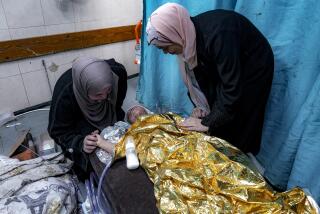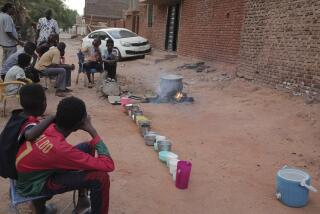AIDS Orphans Tell U.N. of Their Plight
- Share via
UNITED NATIONS — Andrew Jackson Okurut, a 13-year-old from Uganda, can’t remember his father, who died from AIDS complications when Andrew was 5 months old. So before his mother was struck down by the same disease in September, she put together a “memory book” of photos and writing so he wouldn’t forget her too.
“She used to be very fat,” Andrew said, slowly paging through the book. “Then she got very thin, and even her handwriting changed. I knew she had AIDS, but I didn’t think she would die too.”
Andrew spoke Wednesday at the United Nations on World AIDS Day to help the world remember some important faces often forgotten in the global crisis: the children left behind when their parents die.
Dressed in a new black suit with a boy-size bow tie, Andrew seemed special as he implored an audience that included First Lady Hillary Rodham Clinton, singer Harry Belafonte and former basketball great Earvin “Magic” Johnson to remember the more than 11 million children who have been orphaned by the pandemic. But his case is all too common: A report by two U.N. agencies shows that 95% of the orphans, like him, live in sub-Saharan Africa.
The disease has unraveled decades of social advances, the report by UNAIDS and UNICEF says. The orphaned children often are thrown from poverty into destitution as grandparents and their communities become overburdened.
Many--especially girls--must drop out of school, and, without parental protection, some are sexually abused or exploited. More than half a million children have been infected with HIV--the virus that causes AIDS--by their mothers at birth or through breast feeding.
Noting that more people have died of AIDS than have been killed in wars this century, Urban Jonsson, UNICEF’s regional director in Africa, highlighted important differences for the survivors.
“While war orphans receive gratitude and sympathy from everybody, AIDS orphans receive little sympathy,” he said. “They bear part of the ‘fault’ or the stigma and receive sometimes only pity, if they are lucky.”
The conference ended with a “call to action” urging countries and communities to educate young people to make sound decisions about their relationships and practice safe sex. The U.N. agencies also encouraged special emphasis on education for girls, who tend to be pulled out of school first when money is tight or extra hands are needed at home but who can also have a greater impact on family finances and lifestyle when better educated.
Finally, the agencies asked for help to make medicine more affordable and to speed research on an AIDS vaccine.
At the conference, Khomsan Sang-sue-moon, a 14-year-old orphan from Thailand, represented the next wave of AIDS orphans expected in Asia. And Paris Lane, a 17-year-old from New York who also lost both parents to AIDS, reminded people that it is not only a problem of the developing world.
His father, who was in and out of jail throughout Paris’ childhood, died six years ago. His mother, a drug user, went into rehabilitation so that she could care for her children but died five months ago.
“That’s when I lost all faith in everything,” Paris said. “I couldn’t understand why God would take away someone who was trying to make right from wrong.” His message to others in his situation: “Your life is not over when your parents have AIDS. You have to go on.”
Andrew the Ugandan knows he has to go on, but it is difficult. He loves school, he said, and wants to obey his mother’s wishes for him to study hard. “Since your father left you young, I have suffered with you so much,” she wrote in his memory book underneath a picture of herself laughing with her family. “That’s why I want you to read very hard if the chance is there.”
But he thinks there is no chance. “It is time for me to work now,” he said. “There is no one to pay schooling fees for me.”
A representative of UNAIDS, Jim Carmichael, confirmed that there are no special plans to pay Andrew’s tuition, which, including books and uniforms, is about $150 per year. “He’s literally one of a million cases in Uganda,” Carmichael said.
To help, contact Carmichael at UNAIDS: jcarmichael@unicef.org, or call (212) 824-6644.
*
* NIGHT OF MEMORIES: Angelenos who have lost loved ones to AIDS gathered for an interfaith service. B1
More to Read
Sign up for Essential California
The most important California stories and recommendations in your inbox every morning.
You may occasionally receive promotional content from the Los Angeles Times.













